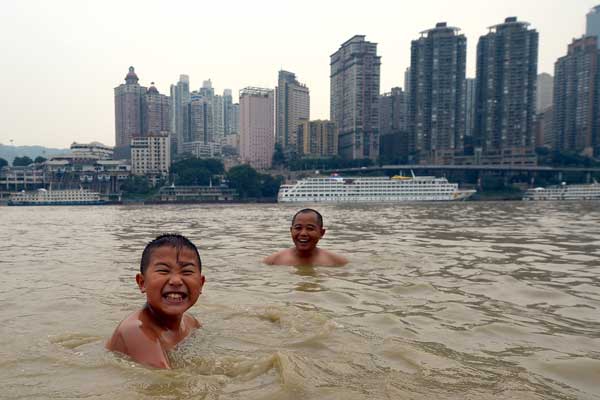Summer heat leaves cities gasping as mercury rises
Xu Lianju is possibly one of the happiest people in Hangzhou right now. She runs a Nongfu Spring bottled water franchise, with business booming thanks to this year's scorching summer heat.
"I've had to take on three extra delivery workers to keep up with demand," she said, adding that sales are five times the level in early spring. "I'm even having to deliver water myself, it's that busy."
 |
|
Chongqing residents find that swimming in the Jialing River is the best way to beat the summer heat.RAN WEN / FOR CHINA DAILY |
And Hangzhou is not even the city where the mercury has risen highest in recent years.
Analysis by the China Meteorological Administration's National Climate Center shows the Zhejiang provincial capital in third place in the heat chart behind Fuzhou, the Fujian provincial capital in first place, and Chongqing.
Haikou, capital of the island province of Hainan, is in fourth place.
Fuzhou experienced the most days (nearly 33) when temperatures rose above 35 C — classified as "abnormally hot" — on a yearly average from 1981 to 2010.
As of Tuesday, the city had seen 17 such days this summer, including 13 in a row, according to its meteorological bureau.
Dong Li, a doctor at Fuzhou Children's Hospital, said there has been a sharp increase in cases of fever and sunstroke in recent weeks. Children and the elderly are most at risk from heat-related illnesses, he said. The heat claimed the life of a construction worker on June 29, when temperatures reached 36 C.
Chongqing, the second-hottest city, has had nearly 30 abnormally hot days on average each year, according to the National Climate Center.
The city's meteorological bureau issued a heat alert on Sunday, a day before temperatures rose to nearly 42 C. The July record of more than 43 C, set in 1971, still stands.
Kossi A. Vanessa, a 26-year-old student at Chongqing Jiaotong University, said summer in Benin, her home country in West Africa, is cooler than in Chongqing. She said the highest temperature in Benin is about 30 C, helped by a sea breeze.
"It's my fifth summer in Chongqing and I've been getting used to the heat," she said.
Hangzhou's meteorological bureau said that from the end of April until Monday this week the city experienced temperatures of more than 35 C on 15 days.
Yang Jun, deputy director of the bureau, said the heat is largely due to the city being surrounded by mountains on three sides, hampering air flow.
Haikou has also had more abnormally hot days this year than in 2012, Guan Menyuan, director of the city's meteorological bureau, said.
Lin Weixiang, a 53-year-old cleaner in the city, said he wears a hat, face mask and clothing with long sleeves to protect against sunburn. "A large water bottle and plenty of rest is necessary," he said.
Last year, the National Climate Center released rankings based on a heat index, combining temperature and humidity data from 1981 to 2011, to gauge how people were coping with high temperatures.
Chongqing, Fuzhou, Hangzhou and Nanchang, in Jiangxi province, topped the chart in that order.
Zhang Cunjie, a climate expert with the center, said that based on different factors, including the highest temperatures and abnormally hot days, people reached different conclusions on how the hottest city was ranked.
Global warming and the urban heat island effect — where a metropolitan area is significantly warmer than its surrounding rural areas due to human activities — have contributed to hotter summers, Zhang added.
Luo Wangshu in Chongqing, Sun Li in Fuzhou and Huang Yiming in Haikou contributed to this story.
Registration Number: 130349



























